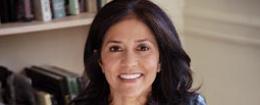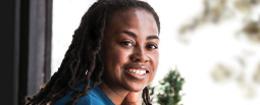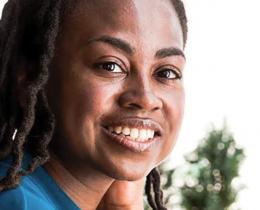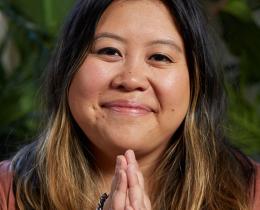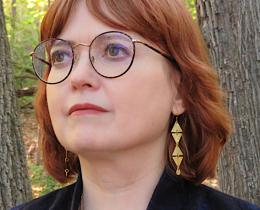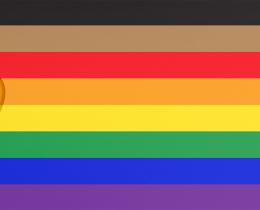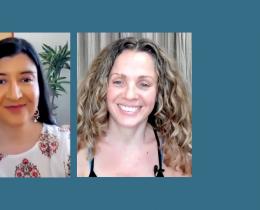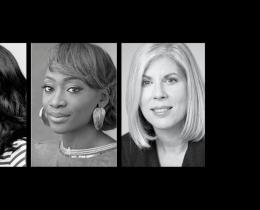Omega: Can you describe how Women, Action, and the Media (WAM!) is supporting the free expression of women and transgender people in the media?
Jamia: What is really special about WAM! is that it’s a movement for gender justice in the media that is intergenerational, because our membership composition and our leadership in terms of the board, staff, and chapter leaders are intergenerational.
Unlike any other organization I’ve been a part of before, the natural existing constituency of people on our list, people in our network, people in our chapters, is pretty diverse. I find it exciting that our mission and values attract a wide range of people from various walks of life and perspectives.
Having those different perspectives is important because a big part of our mission is working to have a people-powered movement. We believe in putting people first and in inclusive movement building. We can’t work for equality and liberation and gender justice without that, so it’s important to our mission that our leadership is constructed that way. That sense is shared in our membership and the people who are attracted to this work, which is exciting.
Omega: What’s the biggest thing that stands in the way of a truly integrated—across generation, race, class, and gender—feminist network?
Jamia: We have our work cut out for us. WAM!ing is a verb. There are so many reasons why we WAM! and a big part is the 3.3 billion women in the world today.
If you look at corporate media and mainstream media, most have come to the conclusion that a large percentage of people I just spoke about have no stories to share, have less stake in the issues, and less power in those issues, because media stories aren’t being represented in the conversation or reflecting the important voices of people who are impacted and affected.
Why? Well, when you look at decision-makers in media—shaping editorial decisions, shaping the hiring decisions around who gets jobs in leadership, deciding how money is being spent and what things are being covered—such a small percentage of those are women and gender nonconforming people that we lose those perspectives. That has implications in the present and it also has implications for the future, history, and archives of the work that’s being done today.
Moreover, when you lack representation in mainstream media jobs, it reinforces itself because young women don’t see possibilities or futures in a field where they don’t see opportunities for leadership and they don’t have the mentorship and sponsorship connections that others do.
We work on campaigns that are direct action and networking opportunities, and drive our own media creation to ensure that our voices are amplified and that women and gender non-conforming folks are getting the space we need to advance equality in the media.
In terms of free expression, when women are experiencing online abuse in disproportionate numbers, that is a form of harassment and intimidation. We have done a lot of work tracking, building, and amplifying research and making recommendations to tech influencers make the Internet a safer and less toxic space for women and trans people and gender-nonconforming people. It’s important because that sort of toxicity limits our access to free expression.
Omega: Culture writer for GQ Magazine and GQ.com and a weekly columnist for the Guardian, Lindy West has said that being threatened is just part of her job. What do you think is the most effective way to deal with online harassment, personally and socially?
Jamia: Unfortunately what Lindy said is true. In my work, it’s part of the job. Some people who work in humanitarian aid in dangerous circumstances have hazard insurance and I think, “There’s no hazard insurance that exists for public speaking women. [Laughs.] How great would it be if it did, because there’s definitely a need for it.”
The targeting of women, women of color, trans people, disabled people, and other groups who are marginalized and oppressed and who are speaking up and taking space online has reached crisis levels.
Hate speech, doxing, violent threats, dead naming (outing people’s former names online), mobbing and gang stalking online, et cetera—all of these are used to silence the voices of marginalized people and to keep us from engaging in public discourse on a daily basis. There are well-documented examples of these attacks and the impact they have on women’s lives everywhere in research by PEW and WAM!—we actually released a report on reporting, reviewing, and responding to harassment on Twitter this year.
We are very dedicated to this issue and are part of the Speech and Safety Coalition, a group of women’s activist organizations that work to ensure that we have access to free expression and free speech and safety online. It has been integral in helping support us through the pilot project that informed our report on harassment on Twitter.
We learned that using research-based recommendations and solutions is important in achieving systemic change at media and online organizations. It’s important in surfacing these issues and illuminating them for the media and the general public because it’s a complex issue that not everyone understands as a cultural problem.
We have a severe cultural problem, first around people not understanding the heft of the psychic toll and also the real violent impact that this sort of sexual harassment and stalking has on women, and girls, online. Twenty-five percent of young women have experienced sexual harassment online. Second, so much of the hatred and online harassment that we see is focused on women’s bodies—fat shaming is something that I see every day. It’s one of the go-to’s some people use to attempt to keep us from doing our work and silence us. Actually, size acceptance is one of the WAM! values in our employee handbook.
If I had a dollar for every time people said, “Well, aren’t women just being too sensitive? Just grow a thicker skin, it’s just the Internet.” I would have enough money to fund the entire movement, but unfortunately, I don’t get a dollar every time that is said.

